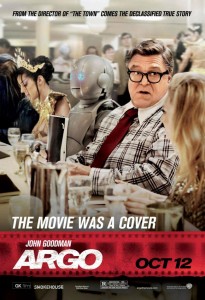The big news du jour — after the colorful and convoluted transgressions of celebrity athletes — is the imminent Academy Awards. The three top contenders for Best Picture are Argo, Lincoln, and Zero Dark Thirty. These three have at least one thing in common: They all stand accused of playing fast and loose with the historical truth of matters.
But what is “objective” about history or, for that matter, about reporting? History is always written by the victors, etc. What we “know,” or believe, about our respective pasts (and presents) always involves reconstructions on the basis of only partial information, observed from particular POVs, always interpreted by people with linguistic, cultural, political and idiosyncratic personal biases. I’ll suggest that 10 different movies about the killing of Bin Laden by 10 different studios would paint 10 different realities, no matter how respectful of the truth they thought they were being. Each would only be “true” to some degree, and from some perspectives. What does Al Qaeda make of Zero Dark Thirty?
Ben Affleck, Argo’s director, has justified in terms of the pursuit of art his taking liberties with certain facts of the Iranian hostage-taking of the US Embassy staff. “It’s that struggle between … the bookkeeper’s reality,” he suggests, “and … the poet’s reality.” He believes that this movie has done justice to the essential events and issues, while winning them a wide audience through an artful and entertaining presentation. (NPR interview, “Affleck On ‘Argo’ and the 1979 Hostage Crisis”)
I’ve just seen the film, which I think was excellent, and I don’t care if Affleck tidied up some details in the interests of managing a dramatic storyline (e.g. having all of the escaped embassy staff holed up in the Canadian Ambassador’s residence, rather than both there and in his deputy’s house). It was a ripping good yarn, and it was inspiring to know it was based on “real events.” And I have no problem keeping my entertainment and my sources of more factual accounts separate.
Breaking news: Bill the Mathematician has informed me that Affleck & Co. seriously short-changed the Canadian input to the hostage rescue, awarding nearly all the brownie points to the CIA. So I’ve just changed my mind about everything I said earlier, eh?
Whatever. Many people like to expound on the difference between “real life” and fiction, fiction being merely made-up stories or, worse, a pack of lies. Real life, on the other hand, is real. By God, eh? Implicit in this proposition: They know what reality is and what it is not.
Well, here’s some news from someone (me) who really knows what is really real and what is really not. Our individual personalities are narratives, under continuous personal and collective construction and maintenance, as are our cultures and even our entire universes. Modern science is able to tell compelling stories supported by rigorous method and criteria of “objectivity” that make it unusually possible to agree across cultures and ideologies and so on about what is real and what isn’t. But these accounts remain narratives, and as such are subject to revision and even radical reinterpretation in the context of new information.
Are we living in a sim?
Militant custodians of the real realities (except for me) tend to hide a real horror of having their beliefs questioned, an unacknowledged fear that doubt or even too much imaginative play will bring the whole house of cards down around their ears.
The thing is, we live stories of our own personal and collective telling. In fact the difference between a good novel and what, in any given context, we term “reality” is in no way clear cut. Fiction and conventional realities are both narratives. Furthermore they inform and shape one another.
Enough for now. More later on narratives, selves, cultures, realities and the truth about why I got home so late last night.
So, Sara: Are you ready to listen now?


The exchange soon lapsed into a discussion of realities, science and Canadians:
Prisana Nuechterlein and Christopher G. Moore like this.
Ken Moritsugu Just read today that the bazaar expedition was fictitious too.
11 hours ago · Like
Collin Piprell I’m okay with that. So long as the filmmakers don’t try to tell me they’re trying to be strictly accurate. I enjoyed it. Thanks again.
2 hours ago · Like
Kevin S. Cummings Historically, Canadians have always been short-changed based on worldly biases, so I feel Affleck was being historically accurate by giving short shrift to my Northern neighbors. That’s my POV and I’m sticking with it …
2 hours ago · Like
Collin Piprell That is an interesting attitude. But we can put up with these trivial misrepresentations, all the while knowing that the Canadians have long been the hidden power behind world-historical events, steering things from behind the scenes since before the days of the Pharaohs. (Discerning linguists working with paleontologists, evolutionary biologists and past-life regression analysts have recently been intrigued by clear evidence of distinctively Canadian diphthongs in ancient spoken Egyptian, eh? ) We should make a movie about it.
2 hours ago · Like
Kevin S. Cummings You’re too kind. And polite. It’s not really an interesting attitude. It’s almost an entirely American one. Please forgive our numerous transgressions in the interests of civility, diplomacy and mutual respect. That movie about diphthongs will have a much better chance of being made in Canada than the USA. Canada supports the arts …sadly, we support the banks. Cheers.
about an hour ago · Like
Collin Piprell If only you’d said sorry, sorry, eh? you could’ve been mistaken for a Canadian.
about an hour ago · Like
Paul McElligott Most Americans think a dipthong is a very small bikini bottom.
about an hour ago · Unlike · 1
Ken Moritsugu How about believability? Could a flight really be confirmed that quickly, particularly in 1979? One person getting through without a matching white slip is possible, but what did immigration do when the next four people on line also didn’t have matching slips?
about an hour ago via mobile · Like
Collin Piprell That had also occurred to me. But I succumbed to a willing suspension of belief, because, with a few allowances, it remained a ripping good yarn.
about an hour ago · Like
Collin Piprell But you do buy my theory re. the influence of Canadian ways of speaking on ancient Egyptian?
about an hour ago · Like
Kevin S. Cummings FLIGHT – another good movie, which I saw yesterday – up for best original screenplay by a young (American) writer, John Gatins. A blend of mostly fiction and some reality. The story goes that Gatins wanted to direct his work – until Denzel Washington got on board. Denzel told Gatins, “I’ll need someone better than you to direct.” And Denzel got his way.
41 minutes ago · Unlike · 1
Paul McElligott we can’t know how Ancient Egyptian sounded Colin as the only thing we have is a pictographic language and no sound files remain
32 minutes ago · Like
Collin Piprell You neglected to note the input of the past-life regression therapists, Paul. Tsk.
32 minutes ago · Like
Paul McElligott Oh yes – everyone was a pharoah at least once. Silly me.
28 minutes ago · Edited · Like
Collin Piprell That’s right. And every time I was regressed to my pharaonic roots, I spoke Egyptian with a Canadian accent, eh? So there you have it.
27 minutes ago · Like
From Martin Perenchio:
I don’t remember when such thoughts about narratives and selves, and “objectivity” became a form of common sense for me, but I’m sure it’s been for the past 30-40 years, and passing time makes it even more common-sensical, with a good dose of doubt anent my own limitations. Does age move us in the direction of M. Montaigne, Qui sais-je? Reading Marilynne Robinson’s Terry Lectures at Yale, Absence of Mind, in which she takes on the “parascientists” (her neologism, I think) and “the brights” for their arrogation of objectivity to themselves and dismissal of those who have the temerity to think otherwise. I think you’re spot on for Argo as well. Good yarn.
Cheers,
Martin
Another perspective on *Argo* and mutually shaping relationships between fiction and “reality”: http://consortiumnews.com/2013/03/07/october-surprise-and-argo/.
I don’t make things up, Collin. This post keeps getting back in my consciousness. Last night my Sara and I (her name is Ratree) watched Argo. It was a good yarn in both realities, I think. Ratree liked it too. But it also causes me to think, since realities are stories why not have a poet’s realty? At least until someone says, “Argo f**k yourself.” Cheers.
I reckon you can live a poetic reality if you want to, supposing you can adopt the appropriate attitude towards experience and don’t get hit by a bus while tripping out on your narrative. Though issues related to describing poetic experience in terms of ‘narrative’ are beyond me, this early in the day. Cheers